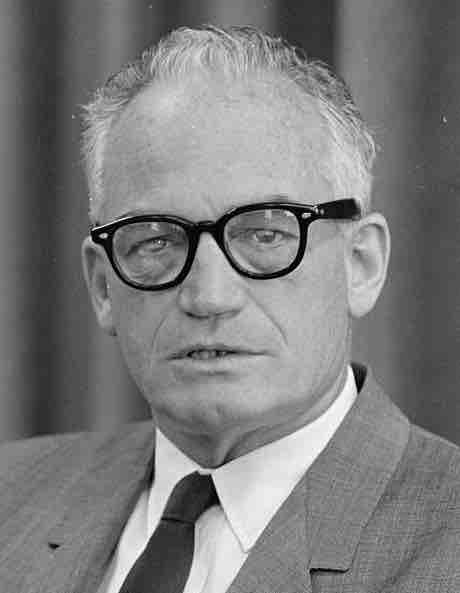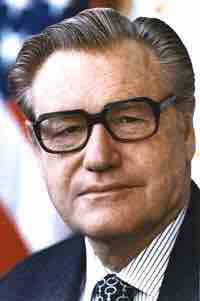Johnson's Reelection
By the time of the United States presidential election of 1964, incumbent President Lyndon B. Johnson had held the office for nearly one year following the assassination of his predecessor, John F. Kennedy. Johnson, whose campaign had successfully tied him to Kennedy's popularity, won 61.1% of the popular vote—the largest win since 1820. In his campaign, Johnson spoke eloquently about two favorable social programs, known as the Great Society and the War on Poverty. Republican candidate Senator Barry Goldwater could not secure the complete support of own party due to his unpopular conservative political platform. Johnson's campaign successfully portrayed Goldwater as a dangerous extremist; although losing the election by a wide margin, Goldwater became influential to the modern conservative movement, and his so-called extremest views became central to the Republican party.
The Campaigns
The 1964 election campaigns proceeded against the backdrop of the tragic death of President Kennedy, assassinated on November 22, 1963, in Dallas, Texas. The loss of the charismatic Kennedy was notably shocking and upsetting to his supporters, while opposition candidates faced the awkward position of running against the policies of a slain president. So as not to appear disrespectful, Republican leaders called for a political moratorium during the subsequent period of mourning. As such, little campaigning took place by either major party until January of 1964, when primary season officially began. It was the view of political pundits of the time that Kennedy's assassination left the nation politically unsettled.

Barry Goldwater, Senator from Arizona and Republican Candidate for President in 1964.
Goldwater's conservative views and penchant for unscripted remarks helped Johnson win in a landslide. However, Goldwater's right-wing conservatism soon became the dominant ideas of the Republican party.
At the start of the election, the Republican Party was deeply divided between its conservative and moderate-liberal factions. Conservatives favored a small, low-tax federal government that supported individual rights and business interests while opposing social welfare programs. Conservatives also resented the dominance of the GOP's moderate wing (based at the time in the Northeastern U.S.). Since 1940, the Eastern moderates had successfully defeated conservative presidential candidates at the GOP's national conventions. Conservatives likened Eastern moderates to liberal Democrats, both in their philosophy and their approach to government. Goldwater's chief opponent for the Republican nomination was Nelson Rockefeller, Governor of New York and longtime leader of the GOP's liberal-moderate faction.

Nelson Rockefeller, Governor of New York.
Nelson Rockefeller was a the leader of the moderate wing of the Republican Party. He was the front-runner to receive the Republican nomination in the election of 1964 until his divorce and remarriage alienated social conservatives.
Although Goldwater successfully rallied conservatives, he was unable to broaden his support base for the general election. Shortly before the Republican Convention, his vote against the Civil Rights Act of 1964 (which Johnson championed and signed into law) alienated most moderate Republicans. Despite the fact that Goldwater had actually voted in favor of the 1957 and 1960 Civil Rights Acts, the Johnson camp used Goldwater's vote against the 1964 Act to portray him as a racist. Goldwater argued it was a matter for individual states rather than federal legislation. Ironically, Johnson (then the Senate Majority Leader) had strongly opposed both the 1957 and 1960 bills and had helped to weaken them.
In the end, Goldwater won only his native state of Arizona and five Deep South states that had been increasingly alienated by Democratic civil rights policies. Despite such a devastating loss, this was the best showing in the South for a GOP candidate since the post-civil war reconstruction era. Some political pundits and historians believe Goldwater laid the foundation for the conservative revolution to follow. The election also furthered the shift of the African American voting electorate away from the Republican Party, a phenomenon that had begun with Roosevelt's New Deal of the 1930s. Since the 1964 election, Democratic presidential candidates have won almost consistently at least 80-90% of the African American vote.